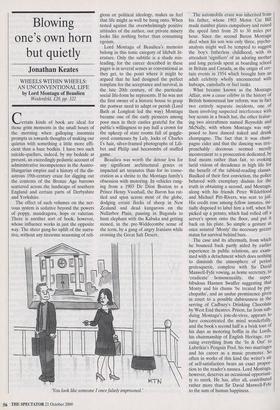Blowing one's own horn but quietly
Jonathan Keates
WHEELS WITHIN WHEELS: AN UNCONVENTIONAL LIFE by Lord Montagu of Beaulieu Weidenfeld, £20, pp. 322 Certain kinds of book are ideal for those grim moments in the small hours of the morning when galloping insomnia prompts us towards thoughts of making our quietus with something a little more effi- cient than a bare bodkin. I have two such suicide-quellers, indeed, by my bedside at present, an exceedingly pedantic account of administrative incompetence in the Austro- Hungarian empire and a history of the dis- astrous 19th-century craze for digging out the contents of the Bronze Age barrows scattered across the landscape of southern England and certain parts of Derbyshire and Yorkshire.
The effect of such volumes on the ner- vous system is sedative beyond the powers of poppy, mandragora, hops or valerian. There is another sort of book, however, whose influence works in just the opposite way. The sheer gung-ho uplift of the narra- tive, without any tiresome seasoning of reli- gious or political ideology, makes us feel that life might as well be hung onto. When tested against the overwhelmingly positive attitudes of the author, our private misery looks like nothing better than consuming egoism.
Lord Montagu of Beaulieu's memoirs belong in this tonic category of lifebelt lit- erature. Only the subtitle is a shade mis- leading, for the career described in these pages is in several senses as conventional as they get, to the point where it might be argued that he had designed the perfect template for the acceptance and survival, in the late 20th century, of the particular social life-form he represents. If he was not the first owner of a historic house to grasp the postwar need to adapt or perish (Lord Bath at Longleat led the way) Montagu became one of the early pioneers among poor men in their castles grateful for the public's willingness to pay half a crown for the upkeep of state rooms full of goggle- eyed countesses by Lely, locks of Charles I's hair, silver-framed photographs of Lili- bet and Philip and hecatombs of stuffed game.
Beaulieu was worth the detour less for any significant architectural graces or impacted art treasures than for its conse- cration as a shrine to the Montagu family's obsession with motoring. In vehicles rang- ing from a 1903 De Dion Bouton to a Prince Henry Vauxhall, the Baron has rat- tled and spun across most of the globe, dodging errant flocks of sheep in New Zealand and dead kangaroos on the Nullarbor Plain, pausing in Buganda to hunt elephant with the Kabaka and getting stoned, in the pre-Widdecombe sense of the term, by a gang of angry Iranians while crossing the Great Salt Desert.
`You look like someone I once falsely imprisoned.' The automobile craze was inherited from his father, whose 1903 Motor Car Bill made number plates cumpulsory and raised the speed limit from 20 to 30 miles per hour. Since the second Baron Montagu died when his son was only three, psycho- analysts might well be tempted to suggest the boy's fatherless childhood, with its attendant 'signifiers' of an adoring mother and long periods spent at boarding school in Britain and Canada, as the origin of cer- tain events in 1954 which brought him an adult celebrity wholly unconnected with hubcaps, camshafts or fuel tanks.
What became known as the Montagu Affair, now a cause célèbre in the history of British homosexual law reform, was in fact two entirely separate incidents, one of them involving suspected interference with boy scouts in a beach hut, the other featur- ing two aircraftmen named Reynolds and McNally, with whom Montagu was sup- posed to have danced naked and drunk champagne. The fact that it was cham- pagne cider and that the dancing was irre- proachably decorous seemed merely inconvenient to a prosecution dedicated, by foul means rather than fair, to evoking lurid visions of decadence in high life for the benefit of the tabloid-reading classes. Baulked of their first conviction, the police behaved with exemplary disdain for the truth in obtaining a second, and Montagu, along with his friends Peter Wildeblood and Michael Pitt-Rivers, was sent to jail. His credit rose among fellow inmates, ini- tially disposed to label him a toff, when he picked up a potato, which had rolled off a server's spoon onto the floor, and put it back on his plate. So simple a gesture at once assured 'Monty' the necessary geezer status for survival behind bars.
The case and its aftermath, from which he bounced back partly aided by earlier experience in public relations, are exam- ined with a detachment which does nothing to diminish the atmosphere of period grotesquerie, complete with Sir David Maxwell-Fyfe vowing, as home secretary, to `eradicate' homosexuality, the super- bibulous Hannen Swaffer suggesting that Monty and his chums 'be treated by psy- chopaths', and an undue prominence given in court to a possible dubiousness in the serving of Cadbury's Drinking Chocolate by West End theatres. Prison, far from sub- duing Montagu's joie-de-vivre, appears to have concentrated the mind wonderfully, and the book's second half is a brisk tour of his days as motoring boffin in the Lords, his chairmanship of English Heritage, res- cuing everything from the 'In & Out' to Lubetkin's Penguin Pool, his two marriages and his career as a music promoter. So often in works of this kind the writer's air of self-satisfaction bears an exact propor- tion to the reader's nausea. Lord Montagu, however, deserves an occasional opportuni- ty to smirk. He has, after all, contributed rather more than Sir David Maxwell-Fyfe to the sum of human happiness.

























































































 Previous page
Previous page